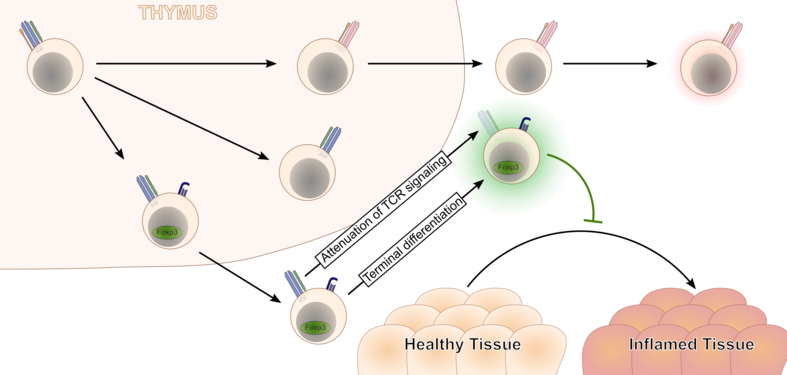About me
I am a immunologist broadly interested in the processes of cell differentiation and functional specialization in the immune system, particularly for T cells. Below is a summary of my current research interests. Please see the other pages for my publications and contributions.
Regulatory T cells and the control of intestinal inflammation
Regulatory T cells are a specialized population of CD4 (helper) T cells, essential for the prevention and control of autoimmunity. They depend on expression of the transcription factor Foxp3. The canonical role of these “Treg” cells within the immune system is to prevent the activation and restrain the activity of adaptive immune cells that inappropriately recognize and target self-antigens. However, Treg cells have been shown to be additionally important for dampening normal immune responses to prevent collateral damage, promote tolerance to innocuous environmental antigens and antigens derived from the microbiota, and support normal tissue functions.
The ability of this population of cells to coherently carry out these diverse functions in the right places and at the right time depends on the further differentiation and specialization of subsets of Treg cells. However, what this means exactly, and how it happens in a molecular sense, is unsettled. I have been exploring these questions in the context of Treg cells controlling immunity and inflammation in the gastrointestinal tract. I have found that at least some subsets of Treg cells undergo terminal differentiation, a process widely accepted to occur among conventional T cell populations, but controversial for Treg cells. Beyond that, despite the centrality of antigen recognition through the T cell receptor for the function of T cells generally, I have shown that these differentiated Treg cells not only can function without inputs from their TCR, but that attenuating TCR signaling is specifically important for their differentiation.

Values
I think there is some inherent tension in keeping ‘politics’ out of the professional setting and out of the way of professional relationships, and acknowledging that one’s values, including those that constitute political positions, will unavoidably perfuse one’s work and work-life. With that in mind, I commit myself to supporting equality, and opposing discrimination in any form, in my personal and professional lives. By equality, I mean societal equality for all, structurally equitable access to resources and opportunity for all, freedom from exploitation, abuse and subjugation for all, regardless of identity or background. By discrimination, I mean any unequal treatment, hate speech, or abuse, conscious or implicit, perpetuated by an individual, entity, or structure against any identity group. I welcome feedback about any behavior on my part that falls short or counters this commitment.
